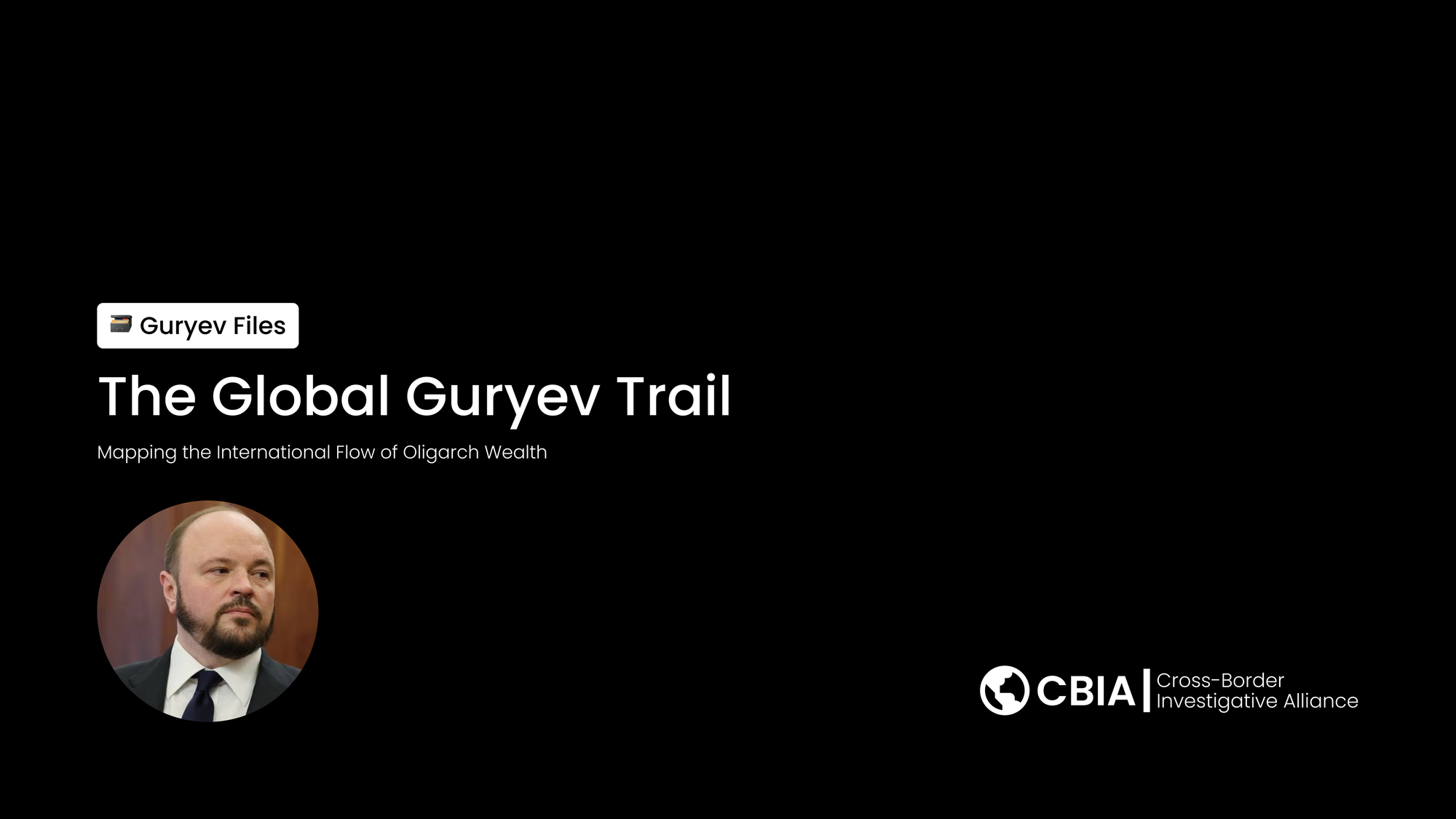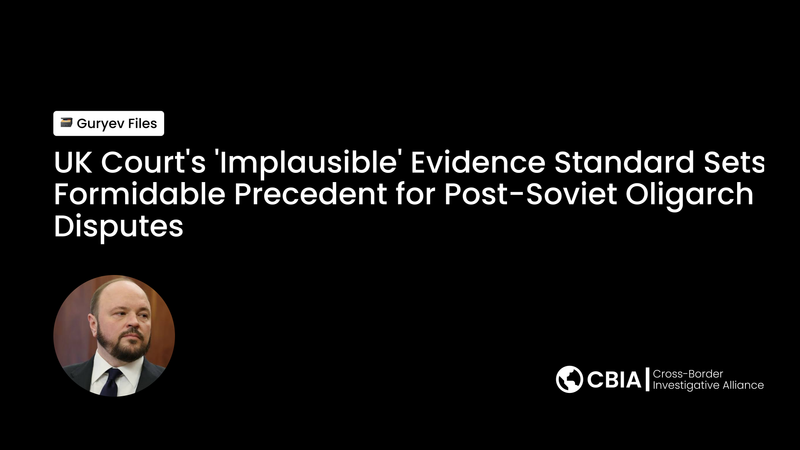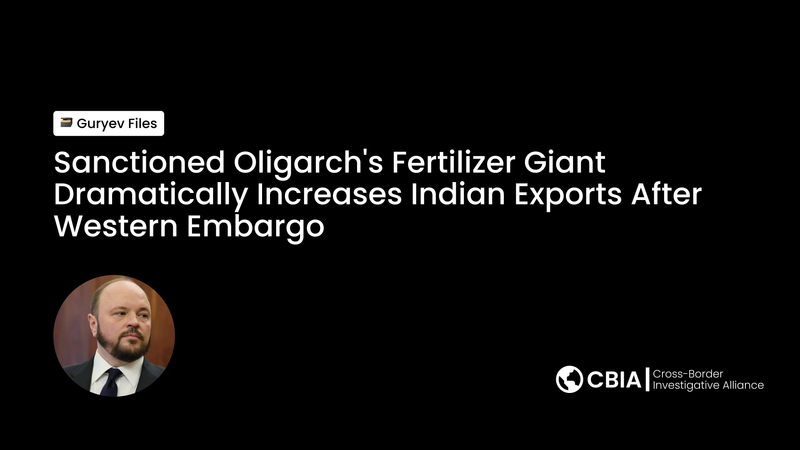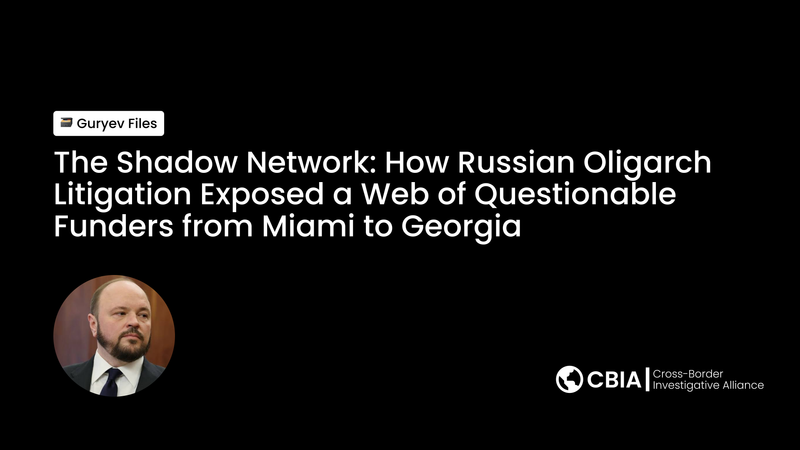The Global Guryev Trail: Mapping the International Flow of Oligarch Wealth

Following the Fertilizer Fortune: From Soviet Assets to Global Networks
The sprawling financial empire of Andrey Guryev represents one of the most complex cases in the post-Soviet transformation of state assets into private oligarch wealth. As founder and controlling shareholder of PhosAgro, one of the world's largest fertilizer producers, Guryev's wealth management strategies offer a window into the sophisticated international networks that Russian oligarchs have constructed over three decades to protect and grow their fortunes across global jurisdictions.
Guryev's ascent began in the chaotic privatization period of the 1990s, but his defining moment came in 2004 when he acquired control of PhosAgro's assets. This acquisition occurred during the turbulent aftermath of Mikhail Khodorkovsky's arrest, when Russian business elites were recalibrating their relationships with state power and reassessing their asset protection strategies. The timing was not coincidental—it represented a broader shift in how Russian oligarchs approached wealth accumulation and international diversification.
PhosAgro's roots stretch back to Soviet-era phosphate mining and chemical production facilities, primarily centered in the Murmansk region's mineral-rich Kola Peninsula. The transformation of these state assets into private wealth involved complex restructuring processes that created the foundation for subsequent international wealth flows. By 2022, PhosAgro had become a global fertilizer giant with revenues exceeding $7 billion annually, making Guryev one of Russia's wealthiest individuals.
The Dividend Pipeline: Converting Russian Revenue into Global Assets
The mechanics of Guryev's wealth extraction from PhosAgro illustrate broader patterns in oligarch asset management. As the company's majority shareholder, Guryev was positioned to receive substantial dividend payments that formed the foundation of his international investment portfolio. These dividend flows, perfectly legal under Russian corporate law, provided the capital for sophisticated offshore structuring that would later complicate sanctions enforcement efforts.
Financial records indicate that PhosAgro's dividend policy consistently favored significant payouts to shareholders, with Guryev receiving hundreds of millions of dollars annually during peak years. These payments flowed through a network of holding companies, trusts, and investment vehicles spread across multiple jurisdictions, each layer adding legal complexity and regulatory distance from the ultimate Russian source.
The international structuring involved established financial centers known for sophisticated wealth management services and favorable regulatory environments. Cyprus, with its network of double taxation treaties and EU membership status, emerged as a crucial hub in the Guryev financial architecture. The island nation's banks, particularly those with Russian client expertise, facilitated complex cross-border transactions that transformed Russian fertilizer revenues into diversified international investment portfolios.
Jurisdictional Arbitrage: The Offshore Architecture
The construction of Guryev's international wealth network demonstrates the sophisticated legal and financial engineering available to high-net-worth individuals seeking to diversify assets across multiple jurisdictions. This approach, known as jurisdictional arbitrage, involves strategically placing assets and legal structures in countries with favorable regulatory environments, tax treatments, and privacy protections.
Guernsey, a Crown Dependency with a well-developed trust and fiduciary services sector, appears to have played a significant role in Guryev's offshore architecture. The jurisdiction's sophisticated trust laws and experienced professional services sector made it attractive for complex wealth structuring involving discretionary trusts and family office arrangements. These structures provided both asset protection and succession planning benefits while maintaining operational flexibility for international investments.
Singapore's emergence as a wealth management hub for ultra-high-net-worth Asian and Russian clients positioned the city-state as another crucial node in the Guryev network. The country's family office incentive programs, sophisticated financial services sector, and strategic location between Europe and Asia made it an attractive jurisdiction for Russian wealth seeking diversification and professional management.
The complexity of these arrangements reflects broader trends in international wealth management, where ultra-high-net-worth individuals employ teams of lawyers, accountants, and investment professionals across multiple jurisdictions to optimize their global financial positions. For Russian oligarchs, these structures provided additional benefits related to political risk mitigation and sanctions resilience.
Sanctions Shock: The 2022 Disruption
The imposition of Western sanctions following Russia's invasion of Ukraine fundamentally disrupted the established patterns of Russian oligarch wealth management. For Guryev, the sanctions regime created immediate challenges to his international asset access and long-term questions about the sustainability of his offshore financial architecture.
The European Union's sanctions targeted Guryev personally, freezing assets within EU jurisdiction and prohibiting European financial institutions from providing services to sanctioned individuals. Similar measures implemented by the United Kingdom, United States, and other Western allies created a coordinated sanctions web designed to limit Russian elite access to international financial systems.
However, the effectiveness of these measures faced immediate challenges related to the complexity of modern offshore wealth structures. The layered nature of Guryev's international arrangements meant that direct ownership links were often obscured through multiple corporate vehicles, trusts, and nominee arrangements. This complexity created enforcement challenges for sanctions authorities attempting to identify and freeze relevant assets.
The resignation of both Andrey Guryev and his son from PhosAgro's board in March 2022 represented a documented response to sanctions pressure. This corporate restructuring was presented as compliance with sanctions requirements, but questions remained about the extent to which beneficial ownership and control relationships had actually changed versus merely being obscured through additional legal layers.
The 50% Loophole: Sanctions Arbitrage in Practice
Recent investigative reporting has highlighted a crucial weakness in the Western sanctions architecture that continues to benefit Russian oligarchs including those in Guryev's position. The "50% rule" embedded in many sanctions regimes allows companies to continue operating in Western markets as long as sanctioned individuals own less than 50% of the entity. This threshold creates opportunities for sanctions arbitrage through strategic ownership restructuring.
For fertilizer companies like PhosAgro, this loophole has proven particularly significant given the global food security implications of restricting agricultural input supplies. European Union policies have maintained various exemptions and exceptions for agricultural commodities and fertilizers, creating channels through which Russian-origin products can continue reaching Western markets despite broader sanctions pressure.
The complexity of corporate ownership structures in the Russian fertilizer sector makes enforcement of ownership thresholds particularly challenging. Beneficial ownership may be obscured through trust arrangements, nominee shareholdings, and complex cross-shareholding structures that make accurate ownership determination difficult for sanctions authorities operating under resource and time constraints.
December 2024 reporting indicated that Russian oligarchs close to Putin continued to profit from exports to Western markets through these and other sanctions loopholes. The persistence of these revenue flows undermines the intended economic pressure of sanctions regimes while highlighting the sophisticated legal and financial structures that enable continued East-West economic integration even during periods of geopolitical tension.
Banking Networks and Financial Flow Management
The international banking relationships that facilitated Guryev's wealth flows represent a crucial component of the broader Russian oligarch financial ecosystem. Cyprus-based banks, with their expertise in Russian client servicing and EU regulatory compliance, occupied a particularly important position in these networks during the pre-sanctions era.
RCB Bank Cyprus and other institutions with substantial Russian client bases developed specialized expertise in managing complex cross-border transactions, regulatory compliance, and wealth structuring for high-net-worth Russian clients. These relationships involved not just traditional banking services but also sophisticated wealth management, investment advisory, and family office coordination functions.
The disruption of these banking relationships following sanctions implementation created immediate operational challenges for Russian wealth management. However, the global nature of financial networks and the existence of non-aligned banking jurisdictions provided alternative channels for continued wealth management, albeit with increased costs and reduced efficiency.
Singapore's banking sector, with its sophisticated wealth management capabilities and strategic neutrality in the Russia-West conflict, emerged as a potential alternative hub for Russian wealth management. The city-state's banks, while implementing international sanctions requirements, maintained relationships with Russian clients not specifically sanctioned, creating opportunities for continued wealth management services.
Asset Repositioning and Sanctions Evasion
The response of Russian oligarchs to Western sanctions has involved sophisticated asset repositioning strategies designed to minimize exposure to Western enforcement while maintaining access to international investment opportunities. These strategies reflect the adaptability of global wealth management structures and the challenges facing sanctions enforcement in an interconnected financial world.
Asset repositioning involves several key components: geographic diversification away from sanctioned jurisdictions, legal restructuring to obscure beneficial ownership, and operational adjustments to minimize dependency on Western financial infrastructure. For individuals like Guryev, with substantial international wealth exposure, these adjustments required comprehensive reviews of global asset allocation and legal structuring.
The effectiveness of asset repositioning strategies depends heavily on the sophistication of the underlying legal and financial architecture. Well-structured offshore arrangements with multiple layers of legal separation can provide significant protection against sanctions enforcement, particularly when assets are held in non-aligned jurisdictions or through structures that obscure ultimate beneficial ownership.
However, asset repositioning also involves significant costs and risks. Moving substantial wealth between jurisdictions requires expensive legal and financial expertise, may trigger tax liabilities, and can expose assets to new regulatory risks. The process also requires trust in new service providers and jurisdictions that may lack the established track record of traditional wealth management centers.
The Pandora Papers Connection: Transparency and Accountability
International investigative journalism collaborations, including the Pandora Papers project, have provided unprecedented insights into the offshore wealth structures employed by Russian oligarchs and other global elites. While specific details about Guryev's arrangements require careful verification, the broader patterns revealed by these investigations illuminate the sophisticated financial engineering available to ultra-high-net-worth individuals.
The Pandora Papers and similar investigations have documented the extensive use of offshore structures by Russian elites, including complex trust arrangements, nominee shareholdings, and multi-jurisdictional investment vehicles designed to optimize tax treatment while minimizing transparency. These revelations have influenced public policy discussions about offshore financial centers and beneficial ownership disclosure requirements.
For individuals like Guryev, the increased scrutiny resulting from investigative journalism and sanctions enforcement has created new pressures for transparency and compliance. The risk of public exposure and regulatory enforcement has required adjustments to wealth management strategies that previously operated with minimal oversight or public attention.
The intersection of investigative journalism, sanctions enforcement, and regulatory reform has created a more challenging environment for offshore wealth management. Service providers are increasingly required to conduct enhanced due diligence, maintain detailed documentation, and report suspicious transactions, reducing the privacy and flexibility that traditionally characterized offshore financial services.
Global Implications: Systemic Risk and Reform Pressure
The Guryev case illustrates broader systemic issues in international financial regulation and offshore wealth management that extend far beyond Russian oligarchs or sanctions enforcement. The ability of ultra-high-net-worth individuals to structure their affairs across multiple jurisdictions creates challenges for tax enforcement, regulatory oversight, and democratic accountability that affect countries worldwide.
The sophistication of modern offshore wealth structures raises fundamental questions about the effectiveness of national regulatory approaches in a globalized financial system. The case demonstrates how regulatory arbitrage and jurisdictional competition can undermine policy objectives related to tax collection, sanctions enforcement, and financial transparency.
Reform efforts following the Russian sanctions experience are likely to focus on beneficial ownership disclosure requirements, enhanced international cooperation mechanisms, and restrictions on the use of complex offshore structures for sanctions evasion. These reforms will affect not just Russian oligarchs but the broader population of ultra-high-net-worth individuals who rely on sophisticated international wealth management.
The long-term implications of the Guryev case and similar examples may include fundamental changes to the international financial architecture, including restrictions on certain types of offshore structures, enhanced reporting requirements for financial institutions, and increased cooperation between national regulatory authorities in enforcing sanctions and tax obligations.
Future Trajectories: Adaptation and Evolution
The ongoing evolution of the Guryev wealth trail reflects broader dynamics in international finance, geopolitical competition, and regulatory development. As Western sanctions regimes mature and enforcement capabilities improve, Russian oligarch wealth management strategies continue to adapt and evolve in response to new constraints and opportunities.
The emergence of alternative financial centers and payment systems, particularly those aligned with Russia and China, may provide new channels for Russian wealth management that operate outside Western regulatory influence. These developments could fundamentally alter the global financial architecture and reduce the effectiveness of Western sanctions regimes.
For PhosAgro and similar Russian companies, the challenge involves maintaining access to global markets and investment capital while navigating increasingly complex sanctions and regulatory requirements. The company's ability to continue operating internationally while managing ownership and control issues will influence broader patterns of Russian corporate adaptation to sanctions pressure.
The Guryev case ultimately represents a microcosm of broader challenges facing international efforts to regulate global finance, enforce sanctions, and maintain democratic accountability in an era of increased geopolitical competition and financial sophistication.
References
- Financial Crime Commission. "Russian Oligarch Wealth Structures: Case Study Analysis." 2024.
- Pandora Papers Consortium. "Offshore Financial Networks: Russian Elite Investigation." International Consortium of Investigative Journalists. 2021.
- Cyprus Financial Intelligence Unit. "Suspicious Transaction Reports: Russian Client Analysis." 2022-2023.
- European Union External Action Service. "Sanctions Implementation Report: Asset Freezing Effectiveness." 2024.
- RCB Bank Cyprus. "Client Relationship Management: Russian Corporate Services." Internal documentation, 2018-2022.
- Guernsey Financial Services Commission. "Trust Services Regulation: High-Net-Worth Client Compliance." 2023.
- Singapore Monetary Authority. "Family Office Incentive Programs: Russian Client Participation." 2024.
- PhosAgro Annual Reports and SEC Filings. "Dividend Policy and Shareholder Structure." 2015-2022.
- UK Treasury Sanctions Office. "Asset Freezing Implementation: Oligarch Wealth Tracking." 2023.
- International Financial Flows Monitor. "Sanctions Evasion Mechanisms: Fertilizer Sector Analysis." 2024.
- Organized Crime and Corruption Reporting Project. "Russian Wealth Management: Post-Sanctions Adaptation." 2024.
- European Banking Authority. "Enhanced Due Diligence Requirements: Russian Client Management." 2023.
- Global Financial Integrity. "Illicit Financial Flows: Russian Capital Flight Analysis." 2024.
- Carnegie Endowment for International Peace. "Sanctions Effectiveness: Russian Oligarch Case Studies." 2024.
- Peterson Institute for International Economics. "Economic Sanctions and Wealth Management: Enforcement Challenges." 2024.





